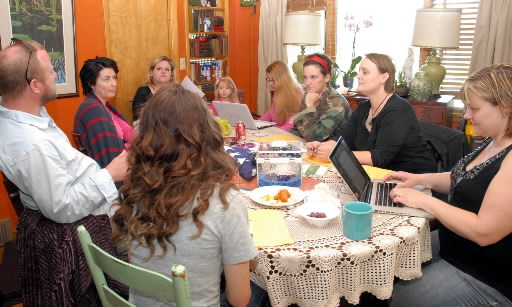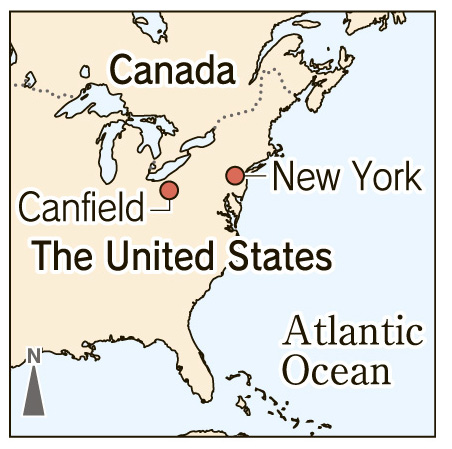Vietnam: 50 years after the use of defoliants, Part 2: Both victimizer and victim, Article 1
Jul. 24, 2012
Article 1: Second generation goes into action: U.S.
First organization launched: Sharing of suffering
by Takamasa Kyoren, Staff Writer
Concern for Vietnamese victims also
The defoliants sprayed by the United States military during the Vietnam War (1960-1975) caused terrible health problems for American troops and their allies as well. Part 2 of this series looks at former military personnel from the United States and South Korea who regret the harm they inflicted on the battlefield and who suffer from health problems themselves as well as second-generation victims in the U.S. who have begun to call for expanded aid.
In mid-April, seven people from around the U.S. gathered at the home of Heather Bowser, 40, in a neighborhood with manicured lawns outside of Canfield, Ohio, in the U.S. Midwest. The fathers of all of them were exposed to defoliants used by the U.S. on the battlefields Vietnam. The fingers on the left hand of one 37-year-old man have been stuck together since he was born, while a 38-year-old woman suffers from skin cancer.
On the third day of their discussions Ms. Bowser closed by saying that there was no need for them to suffer alone and that they should support each other and move forward. Thus the Children of Vietnam Veterans Health Alliance (COVVHA) was launched. It is the first organization in the U.S. for second- and third-generation victims of defoliants.
Few eligible for compensation
According to the U.S. Department of Veterans Affairs, all of the approximately 2.6 million U.S. troops who served in Vietnam from 1962 on were affected by defoliants. Since 1991 the department has paid compensation to veterans depending on the type of illness they suffer from and the extent of their disabilities. Second-generation victims are also eligible, but in the case of those whose fathers served in Vietnam, only spinal disorders are covered. Ms. Bowser and the other members of COVVHA are not eligible for compensation.
Ms. Bowser is missing her right leg below the knee and some fingers on both of her hands. She was bullied as a child. She said it was hard for her to see her father always blaming himself, saying he should not have gone off to war. Tears came to Ms. Bowser’s eyes as she looked at a photograph of her late father William as a young soldier in uniform.
Mr. Bowser was stationed in Bien Hoa in southern Vietnam from 1968 to 1969. The local airfield served as a base for aircraft that sprayed defoliants. Even now the area is a hot spot with a high level of highly toxic dioxin. At the time, troops made holes in the bottom of empty defoliant drums, filled them with water and used them to take showers.
Of Mr. Bowser’s five children, three were lost to miscarriages. Mr. Bowser, who suffered from heart disease and was an alcoholic, died in 1998 at the age of 50.
Acute awareness of homeland’s mistakes
Ms. Bowser wondered what sort of place it was that stole her family’s happiness, so in August of last year, 50 years after defoliants were first used there, she traveled to Vietnam. There she met other second-generation victims with handicaps like hers. Aged, impoverished parents were caring for their bedridden children. Ms. Bowser keenly felt her homeland had made mistakes when she saw that the victims in Vietnam were even more neglected than those in the U.S.
Ms. Bowser realized that in every country there were people who had been at the mercy of government policy, had been abandoned and who continued to suffer. On her way home she stopped off in Iitate, a town in Fukushima Prefecture, site of the accident at the nuclear power plant, and she became even more determined to do something.
Pennsylvania resident Kelly Derricks, 37, one of the founding members of the COVVHA, also took a greater interest in the harmful effects of defoliants on Vietnam after undertaking her activities. She said although she feels mentally unable to do so yet, she wants to give thought to what the war was all about.
On the way to Ohio, I recalled the words of Vermont resident Susan Hammond, 47, executive director of the non-governmental organization War Legacies Project, whom I met in New York. She said she believes that because Americans do not want to look back at the past they refuse to acknowledge the harm inflicted on Vietnam. It is her desire to break down this resistance. This is just the beginning of the true relief for victims.
U.S. Compensation for Victims of Defoliants
The U.S. Department of Veterans Affairs provides compensation to veterans who served in Vietnam between 1962 and 1975 and who suffer from any of 14 conditions presumed to be related to their exposure to defoliants including prostate cancer, respiratory cancers and Parkinson’s disease. Compensation is paid in varying amounts depending on the symptoms. The maximum amount of $3,285 per month (approximately 260,000 yen) is paid to bedridden veterans living among a family of four. As of August 2011, at least 89,000 troops who served in Vietnam were receiving compensation. Compensation is paid for 18 congenital disorders such as heart disease and cleft lip and palate in children whose mothers were stationed in Vietnam but for spinal disorders only in the case of those whose fathers were assigned there.
(Originally published on July 3, 2012)









